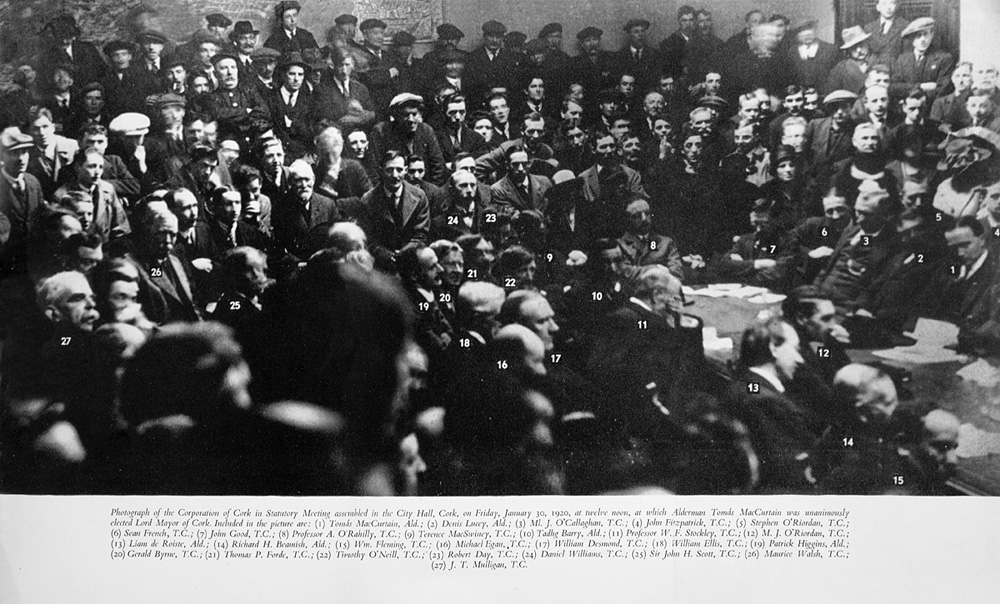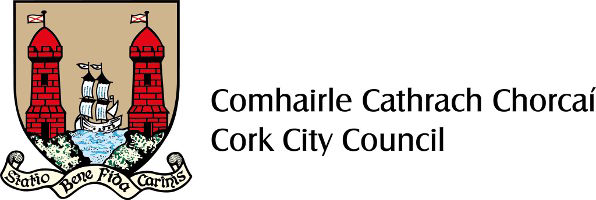Cork Corporation (City Council) Minute Books 1912-1923
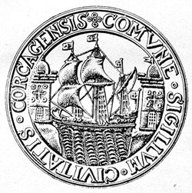
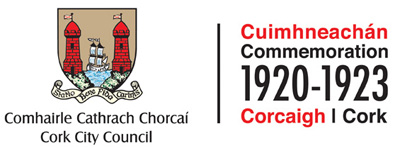
Prior to 1920, the elected members of Cork Corporation (today, Cork City Council) were mainly from the constitutional nationalist/Home Rule, trades/local, or Unionist, parties.
From the time of the Cork Improvement Act of 1853, Cork Corporation comprised 56 elected councillors from a total of 7 wards/electoral areas. Up to December 1920, the Corporation met at (old) City Hall, which was formerly the Corn Exchange.
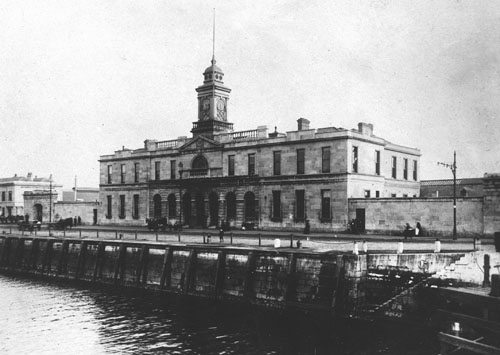
The Lord Mayor from 1912 to 1915 was Sir Henry O'Shea, who, by trade, owned a bakery at South Main Street. In 1913, when Home Rule appeared to be less likely, owing, in part, to the establishment and arming of the Ulster Volunteers, the Irish Volunteers (Óglaigh na hÉireann) was established, with the Cork Corps forming at a first public meeting at City Hall in December 1913. The Autumn of 1914 saw the outbreak of the First World War. By 1915, the War had lead to economic hardship and food and commodities shortages. (For further information in this period see our School Resource Packs: Cork 1912-1918).
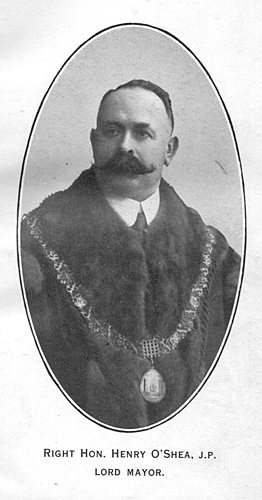
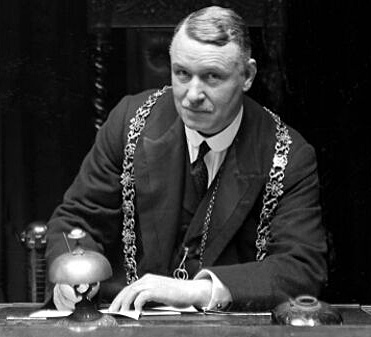
At the time of the Easter Rising in 1916, Lord Mayor T.C. Butterfield, a dentist by trade, played a key role in negotiating terms between the British forces, and the Cork No.1 Brigade Irish Volunteers lead by Tomás MacCurtain. Butterfield was also Lord Mayor in 1917 and 1918. Against a background of the fierce response of the British Government to the Rising, the execution, arrest and internment of Volunteer leaders, plus widespread political and popular opposition to the introduction of military conscription in Ireland, and a well established cultural revival, there was a major increase in popular support for national independence. In 1917/18, the Royal Irish Constabulary was increasingly under pressure to maintain order on the streets of Cork and in other areas, with widespread anti-conscription protests. (See item in Brown collection MS. statement by RIC Sergeant John Brown).
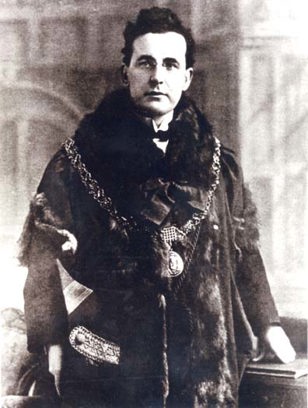
In 1918 and 1919, the electoral franchise was extended, with the local property qualification largely removed, the inclusion of women as voters, and proportional representation was also brought in. In the 1918 general election, Republicans were overwhelmingly victorious, except in some northern counties. The former Cork City High Sheriff William F. O'Connor was elected as Lord Mayor in January 1919. Also that month, Dáil Éireann was established, and the War of Independence/Anglo-Irish War began, which was to see widespread raids, and battles, between the Irish Volunteers/IRA and Crown forces.
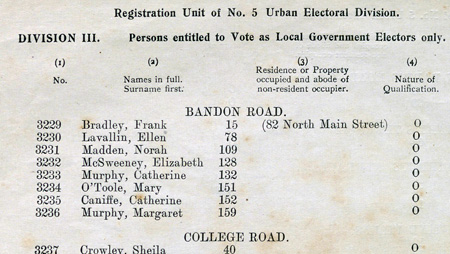
From the Cork City local elections of January 1920, with the newly extended franchise, Cork Corporation was now largely under the control of Republican and Labour councillors. On 30 January 1920, the Corporation elected Tomás MacCurtain, 'Young MacCurtain from Blackpool', as Lord Mayor. He was also the commanding officer of Cork No. 1 Brigade of the Volunteers. A bright and talented man, who dedicated his short life to public service, he was also active in cultural and musical circles, including the Gaelic League. At the same meeting in January, the Council passed a resolution recognising Dáil Éireann as the lawful government of Ireland. A copy of this resolution is displayed in the Council Chamber at City Hall today.
MacCurtain's tenure was tragically cut short when he was shot dead by Crown forces on 20 March 1920, at his home in Blackpool. (See our Tomás MacCurtain Centenary 1920 Commorative Booklet)
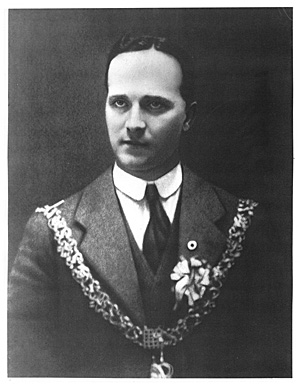
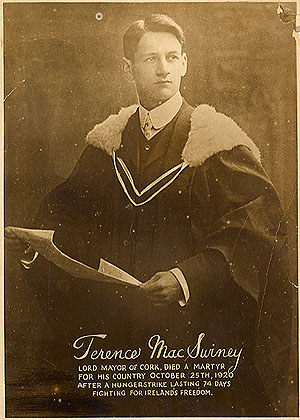
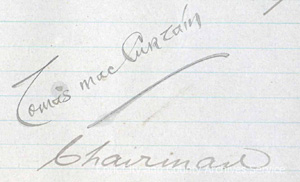
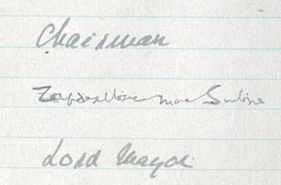
MacCurtain's deputy, Terence MacSwiney, a noted writer and intellectual, and able leader and organiser of the Volunteers, was elected as Lord Mayor on 30 March 1920. Against a background of a fierce guerrilla war, MacSwiney was arrested in August 1920 in a Crown forces raid at City Hall. He refused, unto death, to give up the Mayoral Chain of Office, and when sentenced to 2 years in prison, he began a hunger strike which lead to his death on 25 October 1920. News of MacSwiney's struggle, and his written statements and literature, resounded across the world. (See our Terence MacSwiney Centenary 1920 Commemorative Booklet)
The 3rd republican Lord Mayor of Cork , Donal Óg O'Callaghan TD, was elected on 4 November 1920. O'Callaghan also held the position of Chairman of Cork County Council. His tenure was during the most intense period of the War of Independence, culminating, locally, with the Burning of Cork by Crown forces on 11/12 December 1920. In July 1921, a Truce was made in the Anglo-Irish War/War of Independence, with the expectation of a possible peace treaty being agreed between Ireland and the U.K.
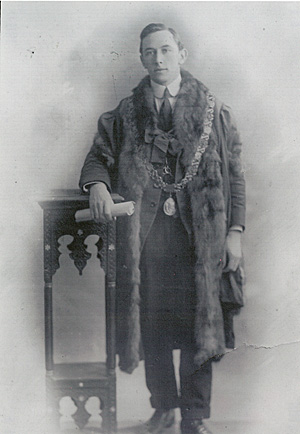
In November 1921, founder member of the Cork Corps Irish Volunteers, Alderman (senior city councillor), and trade-unionist, Tadhg Barry was shot dead by a sentry while interned at Ballykinlar camp, Co.Down. He was the last prominent republican killed before the signing of the Anglo-Irish Treaty in December 1921.
The Treaty was ratified by Dáil Éireann in January 1922. Cork Corporation's elected members were, as with the rest of the country, split on the issue of supporting the Treaty. One of the city's Councillors, Liam de Róiste TD, may have been the first TD to speak publicly in favour of the Treaty, and he also chaired many of the Dáil Treaty debate sessions. In the Dáil Éireann election of June 1922, the pro-Treaty side prevailed. Eamon De Valera and the anti-Treaty Republicans rejected the result, and a bitter and destructive Civil War began in June 1922, which lasted well into 1923. Initially, the anti-Treaty IRA was in control of much of Munster and the southwest of Ireland, including Cork city and hinterland, until the Battle of Cork, from 8 to 10 August 1922, following a sea-borne landing by the Irish Free State/National Army though the harbour town of Passage West and an advance through Rochestown and Douglas.
As with many other areas of Ireland, the security situation in Cork remained serious for a number of months after the Irish Free State/National Army took control, with sporadic shootings and bombings, until the end of the war after the death of anti-Treaty IRA commander Liam Lynch. The political, social and economic effects of the Civil War on Cork and its local government would be felt for many years to come. Lord Mayor O'Callaghan in Cork, an anti-Treatyite, spent much of his time absent from the Corporation, though officially holding office until January 1924, when he was replaced by Cllr. Sean French.
The Corporation largely managed to maintain its’ operations and services during the revolutionary period, and, as far as possible, maintained civil infrastructure and administration in the city during destructive war and upheaval. The surviving Cork minute book volumes contain the final official record of the proceedings and resolutions of meetings of the Council and also including full or partial resolutions or minutes of some of its principal committees and some smaller sub committees, such as those of housing, public works, tolls and markets, improvements, waterworks, public health, parks, law and finance, the general purposes committee, and the committee of whole Council.

The 1912-1923 minute books record the fact that Cork Corporation was both a democratic forum, and an instrument of political power and influence, as part of the general national resurgence in the revolutionary period. Events in Cork resounded locally, nationally and internationally, and were key to the securing of Ireland's national independence.
The Civil War, which ended in April 1923, resulted in divided loyalties and many other political, administrative, and financial, problems. In 1924, a number of local authorities, including Cork, were dissolved by central government, with powers and duties, in Cork, transferred to City Commissioner, Philip Monahan. He took office on 31st October, 1924, and continued to administer civic affairs until 27 March 1929 when the Corporation was re-established and Monahan became the first City Manager in Ireland.
Under the Local Government Act 2001, Cork Corporation was renamed Cork City Council.
*************
Sources:
Cork Corporation/City Council archive collection, Cork City and County Archives
'The Lord Mayors of Cork 1900-2000' book by Antóin O'Callaghan (2000)
Cork Corporation Minutes 13 Dec 1912 - 8 Mar 1918
Cork Corporation Minutes 15 Mar 1918 - 4 Nov 1920
Cork Corporation Minutes 12 Nov 1920 - 28 Dec 1923
The digitisation of the Council minute books was funded by the Local Government Management Agency as a nationwide Decade of Centenaries project.
